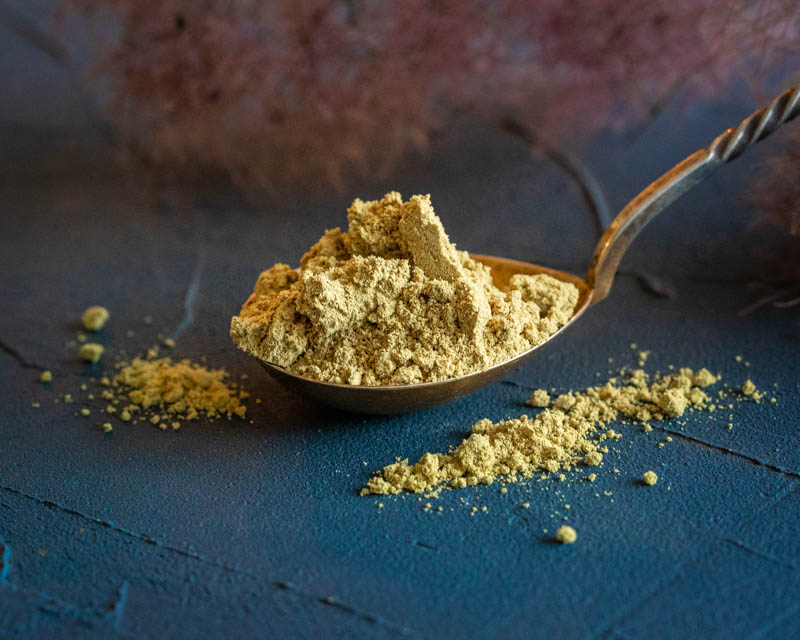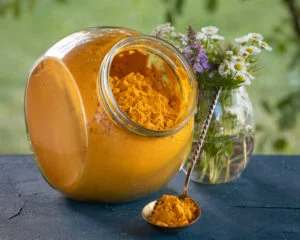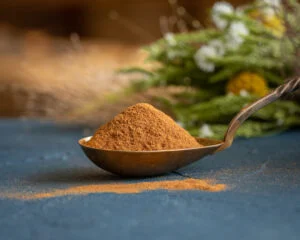Organic ground ginger
From 2.40€
Ginger is considered one of the most valuable and widely used herbs and its healing effects have been known for centuries. Ginger, latin Zingiber officinale, is a perennial herb found mainly in China, India and Nepal.
Ginger comes from a family of plants that includes cardamom and turmeric. Its pungent taste is mainly due to ketones, especially gingerols, which are the main components of ginger and have been studied in many health-related scientific studies. In India and China, ginger has been used for millennia. Ginger is believed to have arrived in the Roman Empire from India 2 000 000 years ago, spreading throughout Europe.
Like many medicinal plants, ginger’s health benefits have been passed on by word of mouth and lack the scientific evidence to back up many of the claims. However, over the last few years, many studies have been carried out on the properties of ginger and its various components, which have confirmed the wide-ranging health benefits of ginger.
Ginger thus not only tastes great, but also has many health benefits. The most commonly used part is the above-ground rhizome, sometimes incorrectly referred to as roots.
When consuming ginger, think “digestion, lungs and circulation” as these are the areas where it is most beneficial. To mention a few of the many benefits of ginger: it relieves cold symptoms, eases coughs and breathing difficulties, soothes sore throats, helps to remove toxins, stimulates digestion, prevents nausea, stimulates appetite, improves circulation and relieves pain. It is believed to help you stay young for longer.
Ginger is used both fresh and dried. Fresh ginger is safe for most people. Dry ginger is spicier and may be too strong for some, so it should be used sparingly in summer and early autumn.
- Fresh ginger is great for colds, coughs, vomiting, nausea and morning sickness. It also has an appetite-boosting effect, helps flush out toxins by increasing circulation in the body and is a mild laxative.
Dried ginger has more dehydrating properties, but also more bitterness than fresh ginger, so it warms the body more, making it more suitable for reducing excess mucus and phlegm.
Both fresh and dry ginger help to fuel the digestive fire.
Due to the warming effect of ginger, it is not recommended in case of ulcers and high temperatures. - Dried ginger powder and fresh ginger are used as a spice in cooking. It also combines well with other spices such as turmeric, cumin, coriander, fennel and cinnamon. Ginger is used in sauces, curries, marinades, soup, stews, baked goods and tea.
Ginger is particularly suitable for the winter season. Ginger tea not only provides cosy warmth on cold winter days, but can also be used to give a wonderful warming flavour to biscuits and other sweets. Most of us probably don’t go without ginger-flavoured treats on our Christmas table.
Remark. Dried ginger is safe to consume, but it is not advisable to consume doses higher than 5 grams per day.
Recipes:
- Prepare a few apples, cut out the stems with the seeds and put them in a baking dish with 1/2 cup of water. Grate fresh ginger into the raisin-cinnamon mixture. Fill the apples with this mixture and bake at 170 C for about 30 minutes. Drizzle with honey or maple syrup after baking. Delicious!
- Chop fresh ginger, splash with lemon juice and eat with a pinch of Himalayan salt. This is said to help nutrient absorption.
- Grate 1 teaspoon of fresh ginger very finely (to the consistency of porridge), add a pinch of Himalayan salt and a drop of oil, and eat 10-15 minutes before lunch. This stimulates digestion.
- CHAI Masala Tea Spice Blend:
6 tbsp dry ginger powder 45g
½ cup raw cardamom pods or 80g raw cardamom powder
¼ cup cloves or 18g powder
¼ cup black pepper or 30g black pepper powder
1-1,5 cinnamon sticks or 8g cinnamon powder
Grind all the ingredients in a coffee or spice grinder to a coarse powder. Mix the ingredients well and store in an airtight container in a dry and dark place. This mixture can be made from already ground spices.
For each cup of CHAI masala, use 1/4 of the – 1/2 teaspoon of this spice mix.
Sources:
https://someindiangirl.com
tcmworld.org
banyanbotanicals.com
NOTE. The information contained herein should not be construed as a recommendation for treatment or other health issues.
We encourage you to make personal decisions about your personal health, taking into account a wide range of sources of information.
Ground ginger root* 100%
*-organic product
347 kcal
Protein 9.1 g
Fat 6,0 g
Carbohydrates 70,8 g
Dry ginger is also a source of trace elements and minerals such as zinc, phosphorus, iron, selenium and manganese, as well as vitamins A, B1 (thiamin), B2 (riboflavin), B6, C and K.
Store in a cool, dry place.


